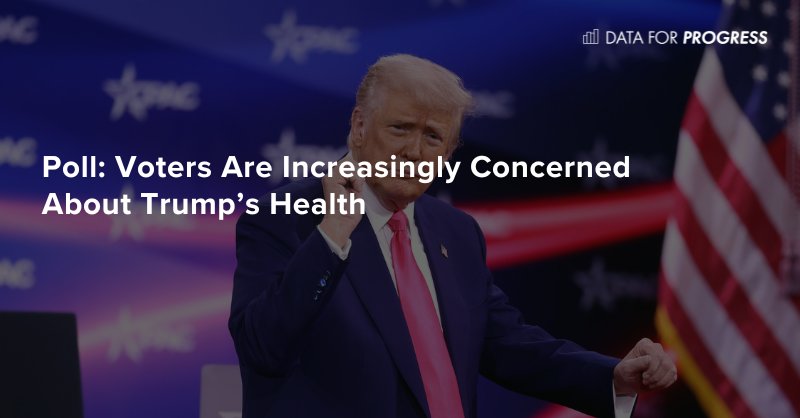The White House acknowledged that President Donald Trump is suffering from a mild, age-related illness known as chronic venous insufficiency. When Trump won the 2024 presidential election at age 78, he became the oldest person elected to the office in U.S. history.
While Trump recently claimed to have gotten “every answer right” on a cognitive exam, new Data for Progress polling finds that voters are increasingly having doubts about Trump’s fitness to lead the country as president.
Voters are split, 49% to 48%, over whether Trump is too old to be president. However, the percentage of voters who believe Trump is too old has jumped 10 points over the last year. This includes a 12-point jump among Independents.
Additionally, a growing share of voters either believe Trump is experiencing cognitive decline or are unsure.
Since last July, the percentage of voters who think Trump is not experiencing decline has decreased from 55% to 45%, while the percentage who think he is experiencing decline has jumped 7 points.
Voters are now less certain that Trump will have the cognitive ability to lead until 2029. In July 2024, before the election, a plurality of voters said he would be able to serve until 2029; today, a plurality say that he will not.
While concerns about Trump’s health are not yet overwhelming, a growing number of voters are beginning to express doubts about his mental and physical ability to lead. Data for Progress will continue to track voters’ perceptions of Trump’s health, as he is on track to be the oldest sitting president in U.S. history by the end of his term.
Cover photo attributable to Gage Skidmore.
Survey Methodology
From July 25 to 26, 2025, Data for Progress conducted a survey of 1,209 U.S. likely voters nationally using web panel respondents. The sample was weighted to be representative of likely voters by age, gender, education, race, geography, and recalled presidential vote. The survey was conducted in English. The margin of error associated with the sample size is ±3 percentage points. Results for subgroups of the sample are subject to increased margins of error. Partisanship reflected in tabulations is based on self-identified party affiliation, not partisan registration. For more information please visit dataforprogress.org/our-methodology.
Subscribe to our newsletter to get our latest updates, reports, and analysis so you’ll never miss a memo.
This website is paid for by Data for the Social Good, Inc., its 501(c)(4).
We respect your privacy and do not tolerate spam. We will never sell or give away your information to anyone without your consent.
© Data for Progress 2025
Voters Are Increasingly Concerned About Trump’s Health – Data For Progress



